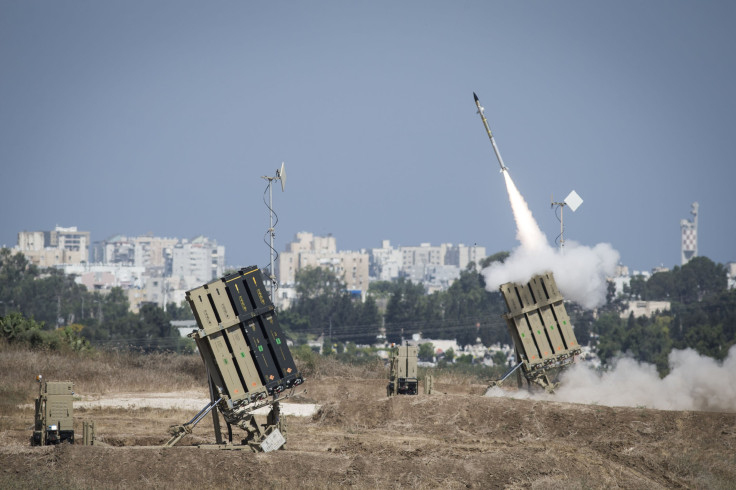West In Dilemma Over Zelensky Accusation Russia Is Aiding Iran Nuclear Program
KEY POINTS
- The West has largely remained silent on the prospect of Russia-Iran nuclear collusion
- Iran toughened its stance saying it will not be compelled by intimidation, provocation
- Tehran seeks to build stronger cooperation between countries sanctioned by the West
Pushing the U.S. and Europe into a dilemma, President Volodymyr Zelensky on Monday, said Jerusalem's decision "not to annoy" Moscow has enabled a military partnership between Iran and Russia, and accused the latter of aiding Tehran's nuclear program in return for affordable weapons.
"In eight months of full-scale war, Russia has used almost 4,500 missiles against us. And their stock of missiles is dwindling. This is why Russia went looking for affordable weapons in other countries to continue terror. It found them in Iran," President Zelensky said in his address at the Haaretz Democracy Conference, organized by Israel's Haaretz newspaper via video link.
"I have a question for you," Zelensky asked. "How does Russia pay Iran for this, in your opinion? Is Iran just interested in money? Probably not money at all, but Russian assistance to the Iranian nuclear program," the Ukrainian president said.
"Probably, this is exactly the meaning of their alliance," Zelensky continued, hinting at Russia-Iran nuclear collusion but offered no evidence to back the statement.
While Iran has denied supplying weapons to Russia, an argument that has failed to convince officials in the West, all have largely remained silent on the possibility of nuclear collusion between Moscow and Tehran, as hinted by the war-time president.
However, Zelensky's accusation is bound to put the U.S. and Europe in a tough bind. On one hand, the West is struggling to toughen its posture on a revival of the 2015 Iran nuclear deal, while on the other, penalizing Tehran with sanctions for providing military aid to Moscow. In both ways, the fear is that Iran will seek closer collaboration with Russia against the West.
Earlier this month, Iranian President Ebrahim Raisi, who met with Vladimir Putin in Uzbekistan on the sidelines of the Shanghai Cooperation Organization (SCO) summit, had said that cooperation between Iran, Russia and China would make both countries "stronger."
Iran toughened its stance on the nuclear deal saying it will not be compelled by threats, intimidation and provocation of the U.S. to give unilateral concessions.
Some Western experts point out that the military deal between Moscow and Tehran shows how isolated both countries are, while others say that it is in Iran's long-term interest to help Russia defeat the NATO-backed Ukrainian military.
Although Israel has publicly condemned Russia's invasion and provided Ukraine with humanitarian assistance, Jerusalem has maintained a strict policy of not providing advanced weaponry and defensive weapon systems to Ukraine since the Russian invasion on Feb. 24.
Israel has repeatedly turned down Kyiv's request for an air defense system citing "limitations" and "a variety of operational considerations," and instead offered to help Ukrainians develop air attack alerts for civilians.
The decision to not provide military aid to Ukraine is based on Jerusalem's strategic security interests in Syria, where Israel maintains freedom of operations to prevent Iranian entrenchment. In order to do this, Jerusalem needs to cooperate with the Russian military which largely controls the Syrian airspace.
Zelensky's statement is aimed at building further pressure on Israel to provide the air defense system Ukraine has been requesting.
"Russian presence in Syria has been significantly reduced thanks to our defends, who are beating the occupiers. But, unfortunately, we do not have our own 'Iron Dome.' We still do not have a modern and effective air defense and missile defense system that could secure our skies. That is why Russia hopes to use terror in the air to compensate for losses on the ground," Zelensky said in his address on Monday.
Israel's opposition leader Benjamin Netanyahu, in an interview with MSNBC on Oct. 18, raised concerns about his country's weapons ending up in Iranian hands and being used against Israeli troops elsewhere, citing that as another reason for their strict policy against sending weapons to Ukraine.
However, in a later interview with USA Today on Friday, Netanyahu said, if elected to power, he will "look into" whether Israel will supply weapons to Ukraine.
Earlier in March, a month into the invasion, President Zelensky had compared the Russian aggression to the Holocaust and urged Israel to abandon its effort to maintain neutrality.

© Copyright IBTimes 2024. All rights reserved.






















